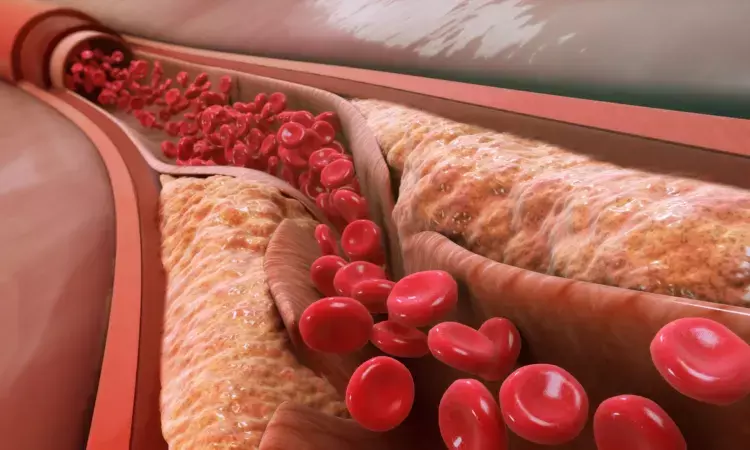- Home
- Medical news & Guidelines
- Anesthesiology
- Cardiology and CTVS
- Critical Care
- Dentistry
- Dermatology
- Diabetes and Endocrinology
- ENT
- Gastroenterology
- Medicine
- Nephrology
- Neurology
- Obstretics-Gynaecology
- Oncology
- Ophthalmology
- Orthopaedics
- Pediatrics-Neonatology
- Psychiatry
- Pulmonology
- Radiology
- Surgery
- Urology
- Laboratory Medicine
- Diet
- Nursing
- Paramedical
- Physiotherapy
- Health news
- Fact Check
- Bone Health Fact Check
- Brain Health Fact Check
- Cancer Related Fact Check
- Child Care Fact Check
- Dental and oral health fact check
- Diabetes and metabolic health fact check
- Diet and Nutrition Fact Check
- Eye and ENT Care Fact Check
- Fitness fact check
- Gut health fact check
- Heart health fact check
- Kidney health fact check
- Medical education fact check
- Men's health fact check
- Respiratory fact check
- Skin and hair care fact check
- Vaccine and Immunization fact check
- Women's health fact check
- AYUSH
- State News
- Andaman and Nicobar Islands
- Andhra Pradesh
- Arunachal Pradesh
- Assam
- Bihar
- Chandigarh
- Chattisgarh
- Dadra and Nagar Haveli
- Daman and Diu
- Delhi
- Goa
- Gujarat
- Haryana
- Himachal Pradesh
- Jammu & Kashmir
- Jharkhand
- Karnataka
- Kerala
- Ladakh
- Lakshadweep
- Madhya Pradesh
- Maharashtra
- Manipur
- Meghalaya
- Mizoram
- Nagaland
- Odisha
- Puducherry
- Punjab
- Rajasthan
- Sikkim
- Tamil Nadu
- Telangana
- Tripura
- Uttar Pradesh
- Uttrakhand
- West Bengal
- Medical Education
- Industry
Aggressive LDL Cholesterol Lowering Not Linked to Cognitive Impairment or Hemorrhagic Stroke Risk: AHA

USA: The American Heart Association (AHA) has released a new scientific statement reinforcing that treating patients to achieve very low levels of LDL cholesterol does not increase the risk of cognitive impairment, dementia, or hemorrhagic stroke. This statement aims to alleviate concerns among physicians about the potential adverse effects of aggressive lipid-lowering strategies.
In recent times, international guidelines have recommended more aggressive reductions in LDL cholesterol levels using a combination of statins, PCSK9 inhibitors, ezetimibe, and other agents to minimize the risk of atherosclerotic cardiovascular disease (CVD) events. However, many physicians have been hesitant to adopt these guidelines due to concerns about potential detrimental effects on brain health.
The scientific statement, published in Arteriosclerosis, Thrombosis, and Vascular Biology and chaired by Dr. Larry Goldstein of the University of Kentucky, takes a comprehensive look at the evidence, particularly focusing on randomised trials, to address these concerns.
Cognitive Impairment and Dementia: The statement's authors found that lowering LDL cholesterol to very low levels did not significantly increase the risk of cognitive impairment or dementia. One pivotal study cited is EBBINGHAUS, which included patients achieving LDL cholesterol levels below 25 mg/dL with the PCSK9 inhibitor evolocumab (Repatha; Amgen).
Hemorrhagic Stroke Risk: While the relationship between aggressive LDL cholesterol lowering and hemorrhagic stroke risk is more complex, several trials, including SPARCL, Treat Stroke to Target, ODYSSEY Outcomes, and FOURIER, showed no evidence of an elevated risk of hemorrhagic stroke. However, the statement acknowledges the need for further research, especially in patients with a history of brain haemorrhages.
The AHA statement underscores the ongoing issue of suboptimal population-level lipid control due to underuse of effective lipid-lowering therapies. Concerns about side effects, including statin-associated muscle symptoms and neurological worries, have contributed to the underuse of these therapies.
Dr. Peter Toth, vice chair of the writing group, emphasised that while the brain contains a significant amount of cholesterol, the blood-brain barrier separates brain lipid metabolism from systemic circulation. This separation makes it unlikely that drugs targeting liver lipid metabolism would negatively affect the brain.
The release of this statement aims to provide physicians with greater confidence in following guideline-directed, aggressive lipid-lowering approaches without undue concern about adverse effects on brain health. The evidence suggests that such approaches can significantly reduce the risk of atherosclerotic CVD events, ultimately benefiting patients.
The American Heart Association's scientific statement provides reassurance to healthcare providers and physicians that aggressive LDL cholesterol lowering, in line with guideline recommendations, does not pose a significant risk of cognitive impairment, dementia, or hemorrhagic stroke. This reaffirmation should encourage the adoption of more aggressive lipid-lowering strategies to improve cardiovascular outcomes in high-risk patients.
Reference:
Goldstein LB, Toth PP, Dearborn-Tomazos JL, et al. Aggressive LDL-C lowering and the brain: impact on risk of dementia and hemorrhagic stroke: a scientific statement from the American Heart Association. Arterioscler Thromb Vasc Biol. 2023;Epub ahead of print.
Dr Kamal Kant Kohli-MBBS, DTCD- a chest specialist with more than 30 years of practice and a flair for writing clinical articles, Dr Kamal Kant Kohli joined Medical Dialogues as a Chief Editor of Medical News. Besides writing articles, as an editor, he proofreads and verifies all the medical content published on Medical Dialogues including those coming from journals, studies,medical conferences,guidelines etc. Email: drkohli@medicaldialogues.in. Contact no. 011-43720751


